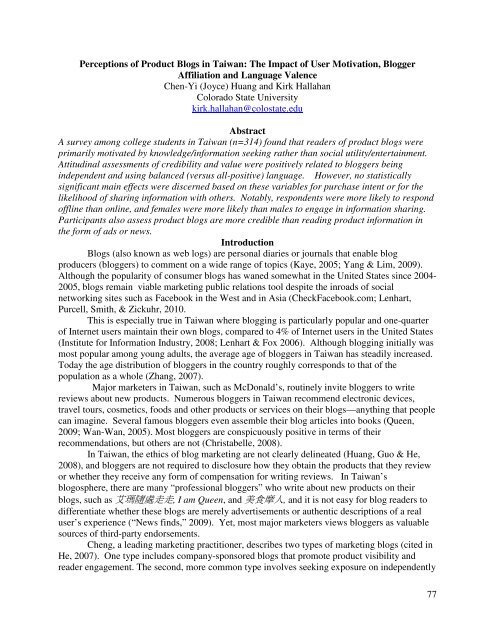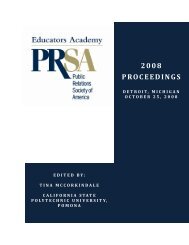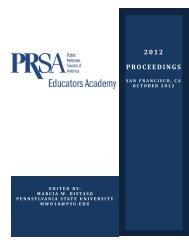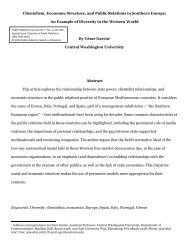2010 - Public Relations Society of America
2010 - Public Relations Society of America
2010 - Public Relations Society of America
You also want an ePaper? Increase the reach of your titles
YUMPU automatically turns print PDFs into web optimized ePapers that Google loves.
Perceptions <strong>of</strong> Product Blogs in Taiwan: The Impact <strong>of</strong> User Motivation, Blogger<br />
Affiliation and Language Valence<br />
Chen-Yi (Joyce) Huang and Kirk Hallahan<br />
Colorado State University<br />
kirk.hallahan@colostate.edu<br />
Abstract<br />
A survey among college students in Taiwan (n=314) found that readers <strong>of</strong> product blogs were<br />
primarily motivated by knowledge/information seeking rather than social utility/entertainment.<br />
Attitudinal assessments <strong>of</strong> credibility and value were positively related to bloggers being<br />
independent and using balanced (versus all-positive) language. However, no statistically<br />
significant main effects were discerned based on these variables for purchase intent or for the<br />
likelihood <strong>of</strong> sharing information with others. Notably, respondents were more likely to respond<br />
<strong>of</strong>fline than online, and females were more likely than males to engage in information sharing.<br />
Participants also assess product blogs are more credible than reading product information in<br />
the form <strong>of</strong> ads or news.<br />
Introduction<br />
Blogs (also known as web logs) are personal diaries or journals that enable blog<br />
producers (bloggers) to comment on a wide range <strong>of</strong> topics (Kaye, 2005; Yang & Lim, 2009).<br />
Although the popularity <strong>of</strong> consumer blogs has waned somewhat in the United States since 2004-<br />
2005, blogs remain viable marketing public relations tool despite the inroads <strong>of</strong> social<br />
networking sites such as Facebook in the West and in Asia (CheckFacebook.com; Lenhart,<br />
Purcell, Smith, & Zickuhr, <strong>2010</strong>.<br />
This is especially true in Taiwan where blogging is particularly popular and one-quarter<br />
<strong>of</strong> Internet users maintain their own blogs, compared to 4% <strong>of</strong> Internet users in the United States<br />
(Institute for Information Industry, 2008; Lenhart & Fox 2006). Although blogging initially was<br />
most popular among young adults, the average age <strong>of</strong> bloggers in Taiwan has steadily increased.<br />
Today the age distribution <strong>of</strong> bloggers in the country roughly corresponds to that <strong>of</strong> the<br />
population as a whole (Zhang, 2007).<br />
Major marketers in Taiwan, such as McDonald’s, routinely invite bloggers to write<br />
reviews about new products. Numerous bloggers in Taiwan recommend electronic devices,<br />
travel tours, cosmetics, foods and other products or services on their blogs—anything that people<br />
can imagine. Several famous bloggers even assemble their blog articles into books (Queen,<br />
2009; Wan-Wan, 2005). Most bloggers are conspicuously positive in terms <strong>of</strong> their<br />
recommendations, but others are not (Christabelle, 2008).<br />
In Taiwan, the ethics <strong>of</strong> blog marketing are not clearly delineated (Huang, Guo & He,<br />
2008), and bloggers are not required to disclosure how they obtain the products that they review<br />
or whether they receive any form <strong>of</strong> compensation for writing reviews. In Taiwan’s<br />
blogosphere, there are many “pr<strong>of</strong>essional bloggers” who write about new products on their<br />
blogs, such as 艾 瑪 隨 處 走 走 , I am Queen, and 美 食 摩 人 , and it is not easy for blog readers to<br />
differentiate whether these blogs are merely advertisements or authentic descriptions <strong>of</strong> a real<br />
user’s experience (“News finds,” 2009). Yet, most major marketers views bloggers as valuable<br />
sources <strong>of</strong> third-party endorsements.<br />
Cheng, a leading marketing practitioner, describes two types <strong>of</strong> marketing blogs (cited in<br />
He, 2007). One type includes company-sponsored blogs that promote product visibility and<br />
reader engagement. The second, more common type involves seeking exposure on independently<br />
77
















